 W
WThe Beholla pistol was developed by Becker & Hollander. During World War I, it was a secondary military pistol used by the Imperial German Army. It was manufactured from 1915 until 1918, where, at that point, about 45,000 were produced.
 W
WThe Bergmann 1896 was a 19th-century semi-automatic pistol developed by German designer Louis Schmeisser and sold by Theodor Bergmann's company. A contemporary of the Mauser C96 and Borchardt C-93 pistols, the Bergmann failed to achieve the same widespread success, although Bergmann himself later went on to design one of the earliest practical and successful sub-machine guns, the MP-18.
 W
WThe Borchardt C93 is a semi-automatic pistol designed by Hugo Borchardt in 1893.
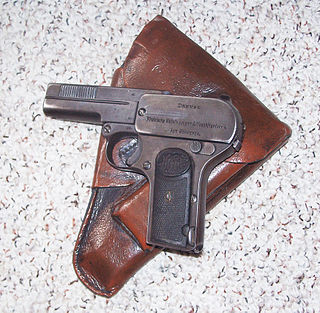 W
WThe Dreyse Model 1907 is a semi-automatic pistol designed by Louis Schmeisser. The gun was named after Nikolaus von Dreyse, the designer of the Dreyse Needle Gun. The Waffenfabrik von Dreyse company was acquired by Rheinische Metallwaren & Maschinenfabrik Sömmerda in 1901, although the Dreyse Model pistols were marketed under the Dreyse name.
 W
WThe ESP 85A is a target pistol produced by the German firearms company Erma.
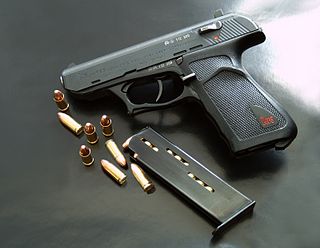 W
WThe HK P9 is a semi-automatic pistol from Heckler & Koch in 9×19mm Parabellum and the first to use a variation of H&K's roller delayed blowback system in a pistol format and polygonal rifling now common in H&K designs.
 W
WThe Langenhan pistol, officially known as the F.L. Selbstlader Cal. 7,65, is a German pistol, designed by Friedrich Langehan and used by German military men, and the police during World War I. The design of the pistol is also similar to the design of FN M1900 pistol. About 55,000 pistols were produced.
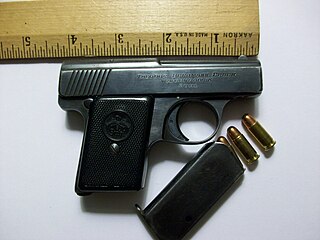 W
WThe 4.25 mm Liliput pistol is one of the smallest semiautomatic handguns ever made. Hence its name, derived from the fictional island of Lilliput, inhabited by tiny people.
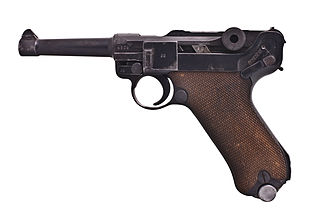 W
WThe Pistole Parabellum—or Parabellum-Pistole, commonly known as just Luger or Luger P08—is a toggle-locked recoil-operated semi-automatic pistol. The Luger was produced in several models and by several nations from 1898 to 1948.
 W
WThe Mauser C96 is a semi-automatic pistol that was originally produced by German arms manufacturer Mauser from 1896 to 1937. Unlicensed copies of the gun were also manufactured in Spain and China in the first half of the 20th century.
 W
WThe Mauser HSc is a 7.65mm pistol introduced in Nazi Germany during World War II, and manufactured until 1977. The designation HSc stood for Hahn Selbstspanner Pistole, third and final design "C". Production was continued in 1945–46 during the French occupation and, from 1968 to 1977 by Mauser. It has a semi-exposed hammer, double-action trigger, single-column magazine, and a spring surrounding the barrel.
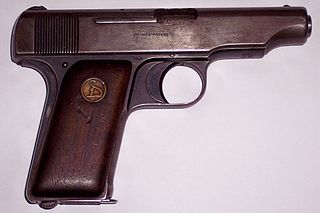 W
WThe Ortgies 7.65 mm pistol was a hammerless semi-automatic pistol produced in Germany in the years immediately after World War I, first by its inventor Heinrich Ortgies and then by Deutsche Werke. Inexpensive, but of good quality, the pistol achieved considerable success at contemporary shooting competitions and, as an export product, was popular throughout the Americas.
 W
WThe Sauer 38H or often just H was a small semi-automatic pistol made in Nazi Germany from 1938 until just after the end of World War II by J. P. Sauer & Sohn, then based in Suhl, Germany. The "H" in the model number is short for "hahn", referring to the internal hammer of the firing mechanism.
 W
WThe Schwarzlose Model 1898 was a full-size, locked-breech, rotary-bolt, semi-automatic pistol invented by Prussian firearm designer Andreas Wilhelm Schwarzlose. It was chambered for cartridges such as the 7.65×25mm Borchardt and 7.63×25mm Mauser.
 W
WThe Schwarzlose Model 1908 was a semi-automatic pistol, designed by Andreas Schwarzlose, released in 1908 in the German Empire and produced until 1911.
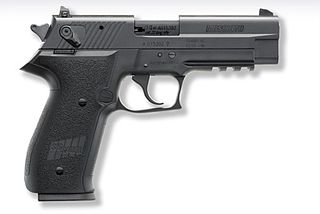 W
WThe SIG Sauer Mosquito is a blowback-operated, semi-automatic pistol aesthetically based on the SIG Sauer P226, but 10% smaller in size and chambered for the .22 LR cartridge. The pistol is manufactured with an aluminum-zinc alloy slide and polymer frame. The controls are similar to those present on full-size models and include a left takedown lever, a left decocking lever, reversible magazine catch and ambidextrous manual safety. In addition, the pistol is provided with an integral safety lock located at the rear of the magazine well which when enabled prevents cycling of slide, hammer fall, and trigger action. The pistol is available in five different configurations: Standard model, Sport, Threaded barrel, Two-tone, Reversed two-tone, and four special editions having different colors.
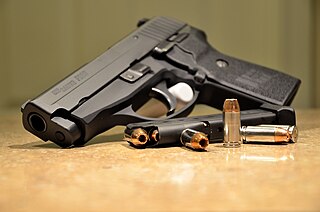 W
WThe SIG Sauer P239 is a semi-automatic pistol designed and manufactured by SIG Sauer—both SIG Sauer GmbH in Germany and SIG Sauer Inc. of New Hampshire, United States. It was produced from 1996 to 2018, and offered in three calibers: 9×19mm Parabellum, .357 SIG and .40 S&W. The P239 became popular in the United States as a concealed carry pistol.
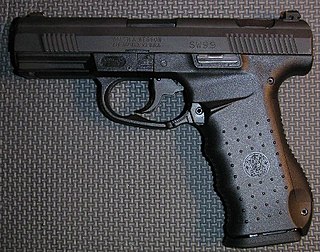 W
WThe SW99 rendition of the popular Walther P99 was the product of a joint collaboration between Smith & Wesson and Walther. The modified receiver used in the SW99 is supplied by Walther and is manufactured in Germany. Smith & Wesson manufactures the slide and barrel of the SW99 in the United States. Though there are slight variations in aesthetic design, the function of the SW99 is identical to its German-made counterpart.
 W
WThe P22 is a semi-automatic pistol chambered for .22 LR rimfire ammunition. Manufactured by Carl Walther GmbH Sportwaffen, it was introduced in 2002.
 W
WThe Walther P38 is a 9 mm semi-automatic pistol that was developed by Carl Walther GmbH as the service pistol of the Wehrmacht at the beginning of World War II. It was intended to replace the costly Luger P08, the production of which was scheduled to end in 1942.